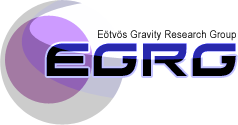
 |
|
|
OUTREACH
Hungarian LSC website
We provide up-to-date informations as well as education and outreach materials for the Hungarian public about the LIGO Scientific Collaboration, its discoveries, and gravitational-wave astrophysics in general. The website is available in Hungarian under url ligo.elte.hu.
Screenshot of the ligo.elte.hu website
LSC-Virgo Meeting in Budapest
Between 19-24 September 2009, the fall LSC-Virgo Meeting was held at Loránd Eötvös University, Budapest. More than 180 scientist from all over the world visited the conference, and participated in its programs. The EGRG group was responsible for organizing and managing all scientific and social programs, public outreach events, conference infrastructure, as well as participant accommodation, catering, and transportation. We also managed to provide an online EVO broadcast of the event for remote participants around the world, throughout the whole meeting. The event was followed by the public through the Hungarian press and media with a high enthusiasm.
The website of the conference, including event photos, is available HERE.
The September 2009 LSC-Virgo Meeting at the Eötvös University, Hungary
A face-to-face meeting on the LSC-Virgo Meeting at the Eötvös University, Hungary
ASPERA participation
Following the efforts of Zsolt Frei Hungary has joined ASPERA-2 on the 1st of September, 2009. ASPERA is an ERANET for Astro-particle-physics. Frei negotiated terms and is participating in meetings as representative of Hungary. His aim is to keep gravitational wave physics among the topics of common calls in scientific funding.
ASPERA works on about 6 key topics within astroparticle, one being gravitational-wave physics, and another aspect being outreach. The first ASPERA organized outreach effort took place in October, 2009.
The 16th ASPERA National Day was held in Hungary on 15 October 2010. Invited by the National Office for Research and Technology (NKTH), representatives of the ASPERA network, the Hungarian science funding system and astropraticle physics research have conferred in Budapest, Hungary. On this conference, the EGRG group was represented by Zsolt Frei, group PI, and Peter Raffai, who gave an overview talk on the scientific activities and results of the EGRG group.
16th ASPERA National Day, Budapest, Hungary. From left to right: Zsolt Frei, EGRG group PI, Vilmos Németh from the National Office for Research and Technology (NKTH), and Thomas Berghöfer, ASPERA coordinator
TV movie "Wavehunters/Hullámvadászok"
A television production company taped and completed a TV movie about astrophysics, with heavy emphasis on gravitational-wave physics, the Eötvös Gravity Research Group, and LIGO itself. The 42 minute full-HD program was first broadcasted on the 27th of August, 2010, on the Hungarian Public Television (Magyar Televízió, MTV 2).
Screenshot from the movie "Wavehunters/Hullámvadászok", with Zsolt Frei explaining the basics of gravitational-wave detection at the GEO600 detector site
Prof. Rainer Weiss, co-founder of LIGO, speaks about the unprecedented sensitivity of LIGO detectors in the main hall of Eötvös University (picture taken from the movie "Wavehunters/Hullámvadászok")
Teaching
Peter Raffai teaches a course for MSc students in the spring semesters at Loránd Eötvös University, Budapest, titled as "Gravitational-wave Astrophysics”. The class is taught in Hungarian, and gives an overview of gravitational-wave physics, hardware and software instrumentation at LIGO, and the basics of detector characterization and data analysis. Besides listening to lectures, participating MSc students prepare oral presentations or overview documents on selected topics, and are also required to take an oral exam. The website of the course (in Hungarian), including its syllabus is available HERE.
Peter Raffai is also responsible for an infrasound laboratory course held for environmental physicist students at Eötvös University. During the course students are familiarized with LIGO, infrasound, and the fundamentals of signal processing techniques. After the course students are expected to produce a report on the measurements they performed with our self-designed infrasound microphone. We provided a simple web page (in Hungarian) to facilitate the signal processing needed to complete the report.
Zsolt Frei teaches two classes at Loránd Eötvös University, Budapest, titled “Extragalactic Astrophysics I and II”. The second semester includes 4 weeks of lectures about gravitational waves. Syllabus included (a) history and overview of observational proofs of General Relativity; (b) GR foundations of gravitational waves; (c) past (mass resonators), current (LIGO), and future (LISA) detectors; and (d) astrophysical sources of gravitational waves.
|
| (c) Eötvös Gravity Research Group 2007 |